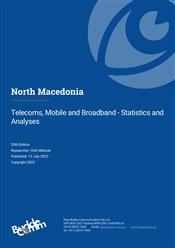North Macedonia Telecoms Market Report
Telecoms, Mobile and Broadband - Statistics and Analyses

North Macedonian MNOs expanding their 5G presence
The former Yugoslav Republic of Macedonia was renamed as the Republic of North Macedonia in February 2019. The country has been a European Union (EU) candidate since 2005 with accession discussions facing delays over the years. As part of the EU pre-accession process, North Macedonia has built closer economic ties with the Union which accounts for 77.5% of Macedonia’s exports and just over half of its imports. Closer regulatory and administrative ties with European Commission (EC) institutions have done much to develop the telecom sector and prepare the market for the competitive environment encouraged in the EU.
As part of EU integration legislation North Macedonia has implemented the principles of the EU’s regulatory framework for communications, established an independent regulator and set out several provisions to provide for a competitive telecom market, including wholesale access to the incumbent’s fixed-line network. Although the fixed telephony market has been liberalised, the incumbent MakTel continues to dominate the sector. However, broadband services are widely available, with effective competition between DSL and cable platforms complemented by wireless broadband and a developing fibre sector. The number of DSL subscribers has continued to fall in recent years as customers are migrated to fibre networks.
Macedonia’s mobile market is served by only two MNOs, MakTel and A1 Macedonia (known as One.Vip before a rebranding exercise in September 2019). The latter was formed from the merger of the local business units of Telekom Slovenije and Telekom Austria. A1 Macedonia in May 2016 was also merged with its sister company Blizoo, and so has been able to provide a full suite of converged services. Mtel, a subsidiary of Telekom Srbija, has also committed to launch mobile services by the end of 2022, a move which will break the duopoly. The MNOs are increasingly focused on expanding their 5G networks, seeking stronger coverage across North Macedonia’s high value urban areas. Mobile data services are also becoming increasingly important following investments in LTE network rollouts and in upgrades to LTE-A technology.
The outbreak of the Coronavirus in 2020 had an immediate impact on telecoms services growth. However, the sector has returned to growth buoyed by an improving economic outlook for the country and rising consumer and enterprise demand for advanced communications services. The crucial nature of telecom services, both for general communication as well as a tool for home-working, has helped to offset pressures on market development.
The report also covers the responses of the telecom operators as well as government agencies and regulators as they react to the crisis to ensure that citizens can continue to make optimum use of telecom services. This can be reflected in subsidy schemes and the promotion of tele-health and tele-education, and the development of a national ICT strategy among other solutions.
Key Developments:
- Telekom Srbija subsidiary Mtel to launch mobile services by the end of 2022;
- North Macedonia signs MoU on 5G technologies with the US; regulator to award 5G spectrum to all applicants in spectrum auction;
- Telekabel purchases cable network KDS DOO from Probistip;
- Government plans to abolish IT sector personal income tax by 2023; publishes national ICT strategy 2021-2025 for public comment;
- MakTel expands G network reach;
- Government imposes e-bills due to coronavirus outbreak;
- Report update includes the regulator's market data updates to end-2021, telcos' operating and financial data to Q1 2022, updated Telecom Maturity Index charts and analyses, recent market developments.
Companies mentioned in this report:
Makedonski Telekom, A1 Macedonia (VIP Operator, One.Vip), Mtel, Blizoo (formerly CableTel), Telekom Slovenije.
Related Reports
- Europe - Mobile Network Operators and MVNOs
- Slovenia - Telecoms, Mobile and Broadband - Statistics and Analyses
- Slovakia - Telecoms, Mobile and Broadband - Statistics and Analyses
- Belgium - Telecoms, Mobile and Broadband - Statistics and Analyses
- Finland - Telecoms, Mobile and Broadband - Statistics and Analyses
- Albania - Telecoms, Mobile and Broadband - Statistics and Analyses
- Lithuania - Telecoms, Mobile and Broadband - Statistics and Analyses
- Bulgaria - Telecoms, Mobile and Broadband - Statistics and Analyses
- Russia - Telecoms, Mobile and Broadband - Statistics and Analyses
Share this Report
TMT Intelligence
A platform to scale your intelligence tasks
Monitor critical insights with our AI-powered Market Intelligence Platform gathering and analyzing intelligence in real time. With AI trained to spot emerging trends and detect new strategic opportunities, our clients use TMT Intelligence to accelerate their growth.
If you want to know more about it, please see:
Research Methodology
BuddeComm's strategic business reports contain a combination of both primary and secondary research statistics, analyses written by our senior analysts supported by a network of experts, industry contacts and researchers from around the world as well as our own scenario forecasts.
For more details, please see:
More than 4,000 customers from 140 countries utilise BuddeComm Research
Are you interested in BuddeComm's Custom Research Service?
Hot Topics
News & Views
Have the latest telecommunications industry news delivered to your inbox by subscribing to BuddeComm's weekly newsletter.